Migraine pain can derail your entire day. You’re looking for relief, and cannabis keeps coming up, but should you use indica or sativa?
This article gives you real answers, not vague suggestions. We’ll explain how these two cannabis types affect migraines differently, using medical research and real user feedback. You’ll learn what the science says, how to choose the right strain, and what to expect in terms of side effects and dosage.
We’ve reviewed medical studies, spoken with doctors, and gathered insight from people who use cannabis for migraine relief. No hype, just honest facts.
By the end, you’ll have a clear understanding of which strain, indica or sativa, might help you the most. You’ll also gain useful tips for trying cannabis safely and effectively, so you can make informed decisions about your pain management.
Understanding Cannabis and Migraines: The Foundation
Migraines can destroy your day. You need real answers about cannabis relief, not marketing hype or confusing medical jargon.
The Migraine Challenge

Migraines steal your life. I know because I’ve seen countless people struggle with the throbbing pain, nausea, and light sensitivity that can last for hours or even days. Traditional medications don’t always work. Many prescription drugs come with harsh side effects.
Some people build tolerance over time. Others find limited relief despite trying multiple treatments. That’s why more people are turning to cannabis.
Here’s the reality: When conventional medicine falls short, patients often turn to alternative treatments. Cannabis offers a different approach to managing migraine symptoms.
Cannabis Essentials for Migraine Relief
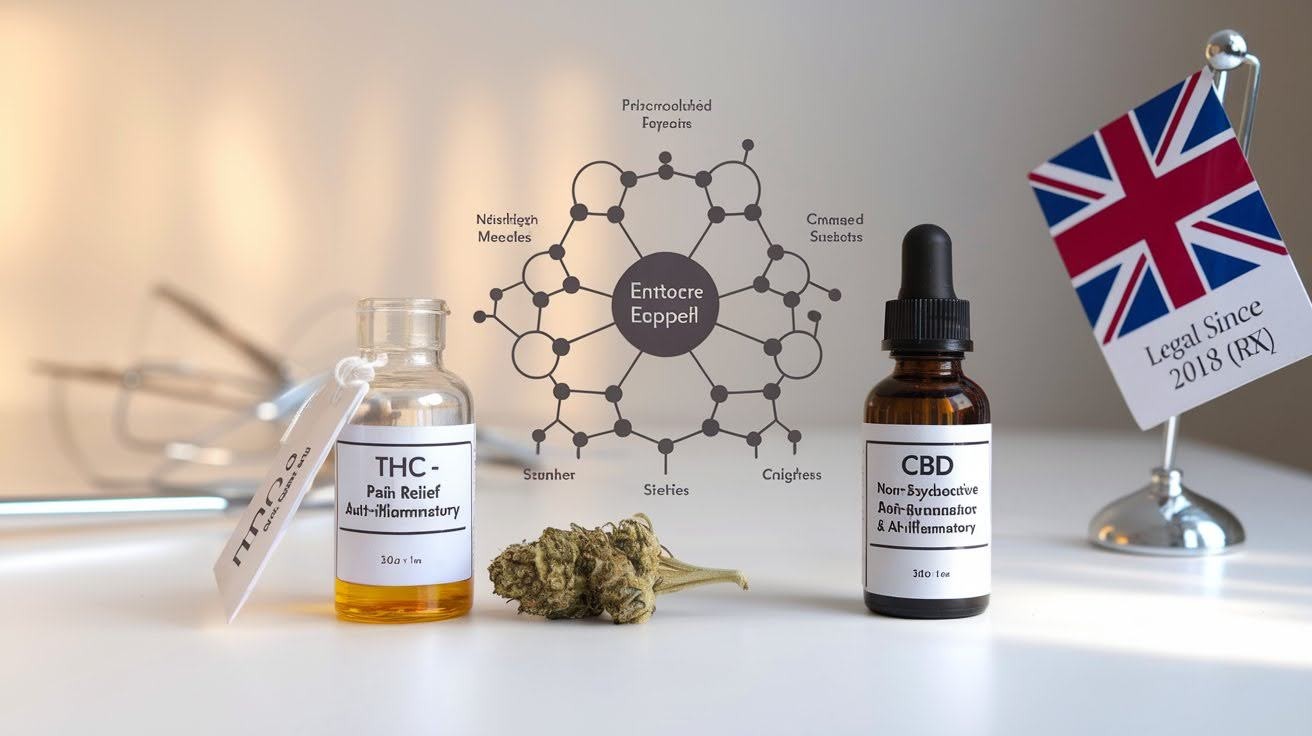
Let me break down the key components: THC (tetrahydrocannabinol) – This psychoactive compound provides pain relief. It’s what makes you feel “high” but also helps reduce inflammation and ease discomfort.
CBD (cannabidiol) – This non-psychoactive compound fights inflammation without mind-altering effects. Many users prefer CBD during daytime hours. Important fact: Medical cannabis has been legal in the UK since 2018 with a proper prescription.
But here’s what most people don’t know. Cannabis contains over 100 different compounds called phytocannabinoids. They work together to create what scientists refer to as the “entourage effect.” This teamwork might be key to migraine relief.
The Science Behind Cannabis for Migraine Relief
Your body already has a built-in pain control system. Let me show you how cannabis works with it to fight migraines.
How Cannabis Works in Your Body
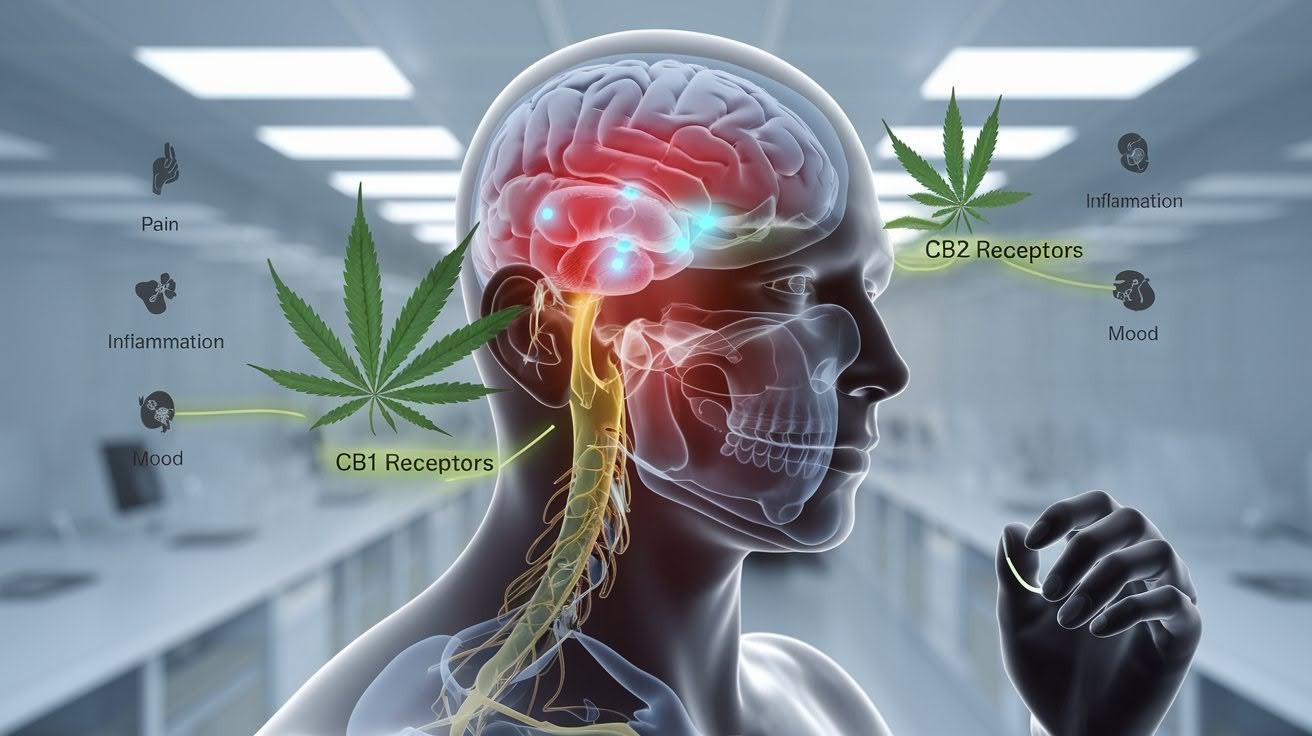
Your body has a built-in pain control system. It’s called the endocannabinoid system, or ECS for short. Think of it as your body’s natural pharmacy. The ECS helps regulate pain, mood, and inflammation.
Here’s how it works: Your body has two main receptor types. CB1 and CB2. CB1 receptors sit mostly in your brain and nervous system. CB2 receptors live in your immune cells and tissues.
Cannabis doesn’t just mask pain. Instead, it works with your body’s existing systems to promote natural healing. This is why cannabis feels different from other medications.
The Terpene Factor: More Important Than Strain Type
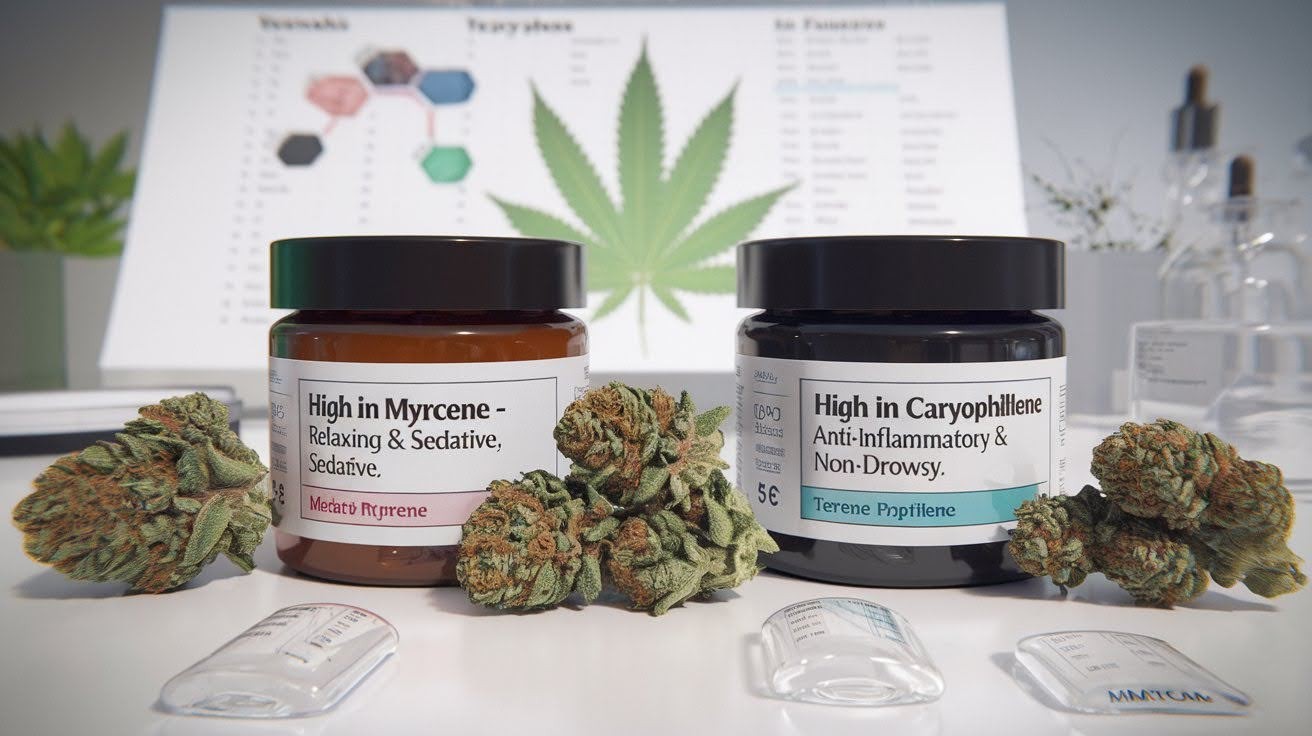
Forget everything you think you know about indica versus sativa. The real game-changer? Terpenes. These aromatic compounds determine how cannabis affects your migraines.
Two terpenes stand out for headache relief:
- Myrcene – This compound relaxes your muscles and provides sedative effects. It’s perfect for tension-related headaches.
- Caryophyllene – This anti-inflammatory terpene directly activates CB2 receptors. It fights inflammation without causing drowsiness.
Here’s what research shows: The terpene profile matters more than whether something is labeled indica or sativa. Why does this matter to you? Because choosing cannabis based on terpenes gives you better, more predictable results for migraine relief.
Indica Strains for Migraines: The Relaxation Route
Indica strains hit migraine pain hard. These powerful, sedating varieties excel at melting away tension and severe headache symptoms.
Why Indica Works for Migraines

Indica strains pack a powerful punch against migraine pain. They typically contain higher CBD levels and create strong sedative effects. Think of indica as your evening medicine cabinet. These strains excel at melting away tension that builds up in your neck, shoulders, and jaw.
Cluster headaches respond particularly well to indica. If you’ve experienced these excruciating attacks, you know how desperate you can feel for relief. The timing matters. Indica works best when you can rest afterward. Many users report significant improvements in sleep, which helps prevent future migraine episodes.
Top Indica Strains for Migraine Relief

The Northern Lights are renowned for their exceptional pain-relieving properties. This strain provides deep relaxation without overwhelming drowsiness. Purple Kush is effective in targeting severe pain and alleviating sensitivity to light and sound. Many migraine sufferers swear by its effectiveness during intense episodes.
Afghan Kush offers traditional pain management with high myrcene content. This ancient strain has helped people manage pain for centuries. 9 lb Hammer combines myrcene and caryophyllene for long-lasting relief. The name says it all – this strain packs a punch and keeps working.
But here’s what you need to know: Individual responses vary significantly.
Best Use Cases for Indica
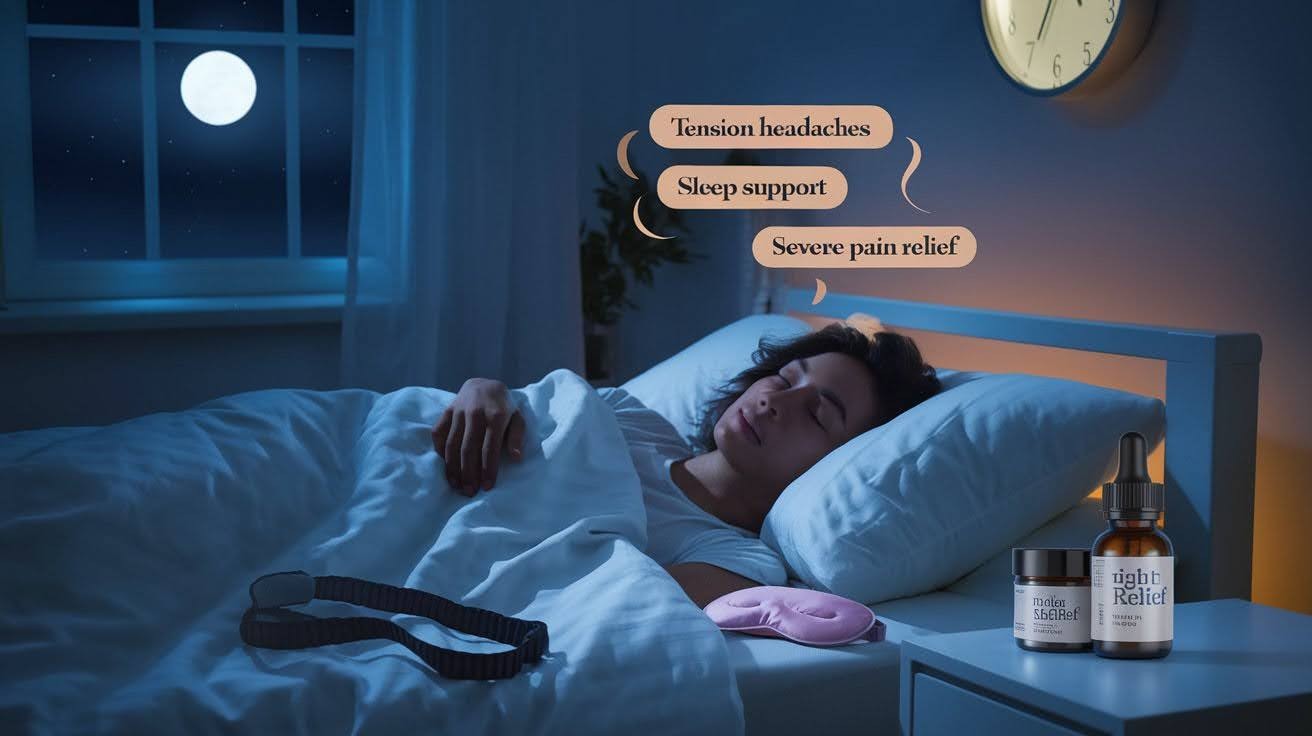
Use Indica when: You’re experiencing tension headaches caused by stress or poor posture. The muscle-relaxing effects target the root cause. Nighttime migraines strike. Indica helps you sleep through the pain instead of lying awake suffering.
Sleep problems accompany your migraines. Poor sleep often triggers more headaches, creating a vicious cycle. Severe pain requires strong sedation. Sometimes you need heavy-duty relief that only indica can provide.
Remember: Start with small amounts and see how your body responds.
Sativa Strains for Migraines: The Energizing Approach
Sativa offers migraine relief without the knockout punch. These energizing strains fight pain while keeping you alert and functional.
Sativa’s Unique Migraine Benefits

Sativa takes an entirely different approach to migraine relief. These strains typically contain higher THC levels and create uplifting, energizing effects. Here’s where sativa shines: it helps combat the fatigue and brain fog that often accompany migraines. Instead of knocking you out, sativa enables you to stay functional.
This matters during the day. You can treat your migraine without losing productivity or alertness. Think of sativa as your daytime ally – providing relief while keeping you engaged with life.
Top Sativa Strains for Headache Relief
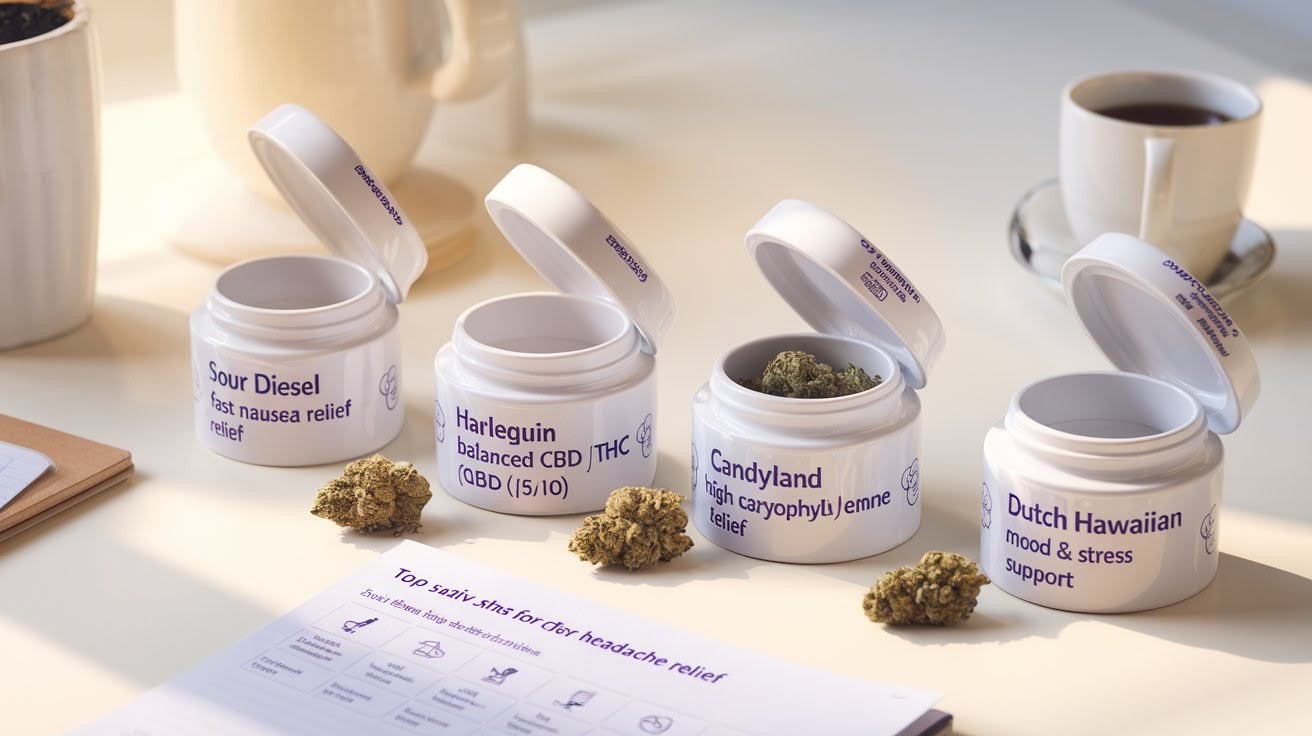
Sour Diesel works fast to reduce nausea and mental fatigue. Many users notice relief within minutes of consumption. Harlequin offers a unique 15% CBD to 10% THC ratio. The medical community favors this strain for its balanced effects and minimal psychoactive impact.
Candyland contains high levels of caryophyllene, making it an excellent choice for relieving muscle spasms that can trigger headaches. Dutch Hawaiian reduces stress while lifting your mood. Stress relief is crucial because anxiety often makes migraines worse.
When to Choose Sativa
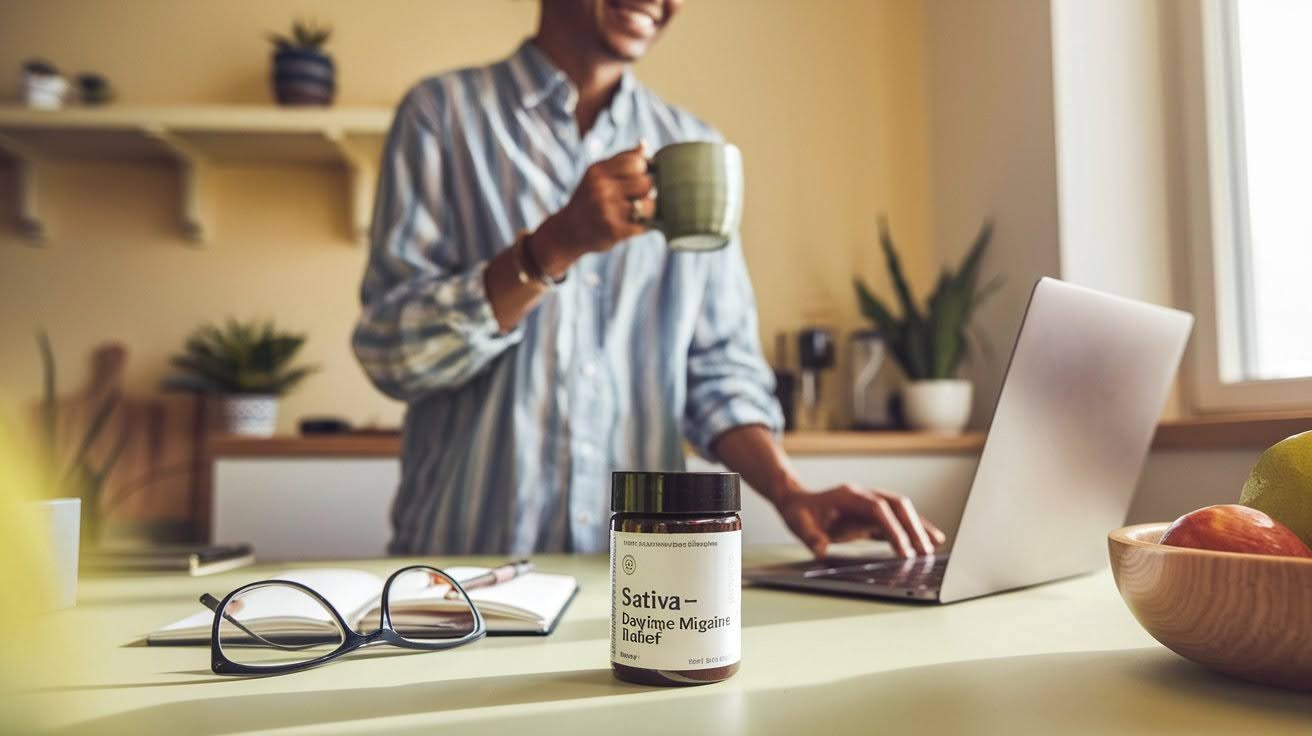
Pick sativa for: Sinus headaches create pressure in your face and head. The uplifting effects help clear mental fog. Migraines with fatigue or depression. Sativa combats the emotional weight that chronic pain creates.
Morning or daytime episodes when you need to remain functional. When daily activities matter, work, family responsibilities, and social commitments don’t stop just because of migraines. Bottom line: Sativa lets you treat pain without surrendering your day.
Research Findings: What the Evidence Shows
Real studies with real patients reveal surprising truths. The data shows what works for migraine relief in practice.
Clinical Study Results
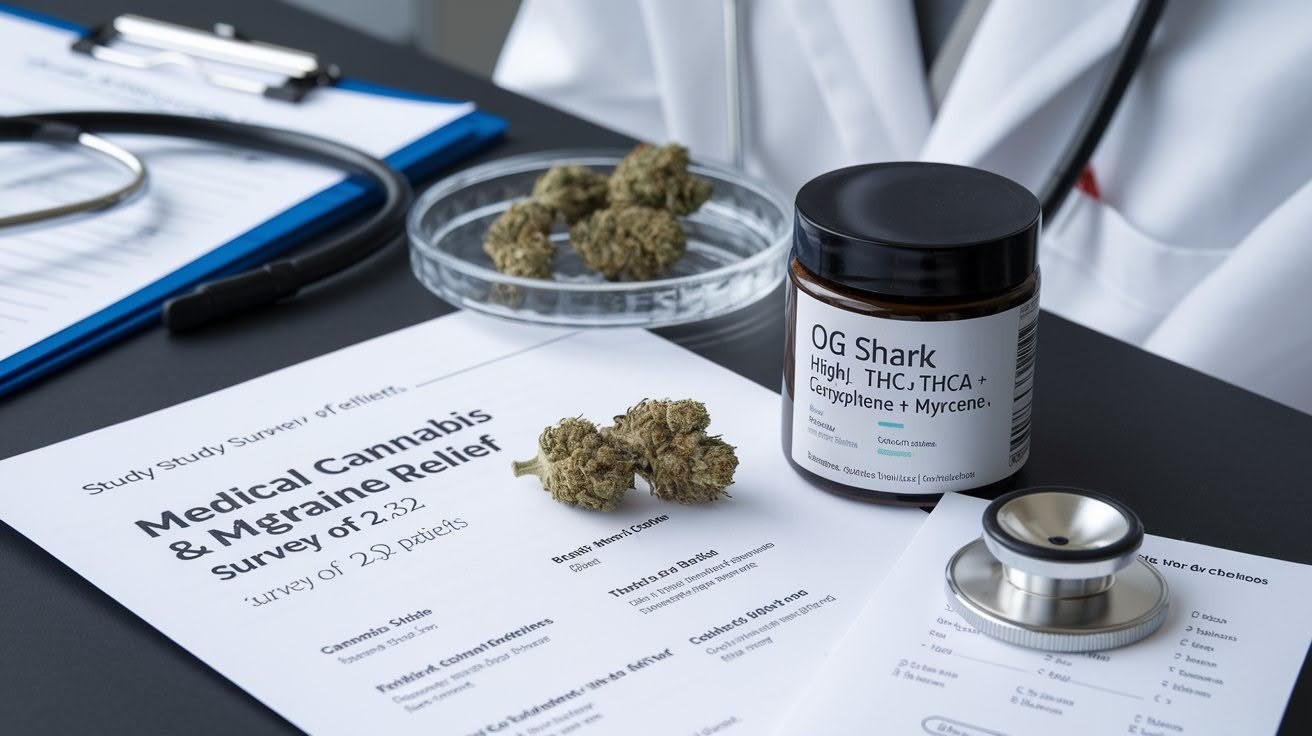
The numbers don’t lie. A major university study found that 88% of headache patients were treating probable migraines with cannabis. Researchers surveyed 2,032 medical cannabis patients to understand real usage patterns. The results might surprise you.
The most preferred strain? “OG Shark.” This strain combines high THC/THCA with β-caryophyllene and β-myrcene terpenes. But here’s the interesting part: Hybrid strains ranked as most popular across all pain groups. This suggests the indica versus sativa debate might be missing the point.
Real-World Usage Patterns
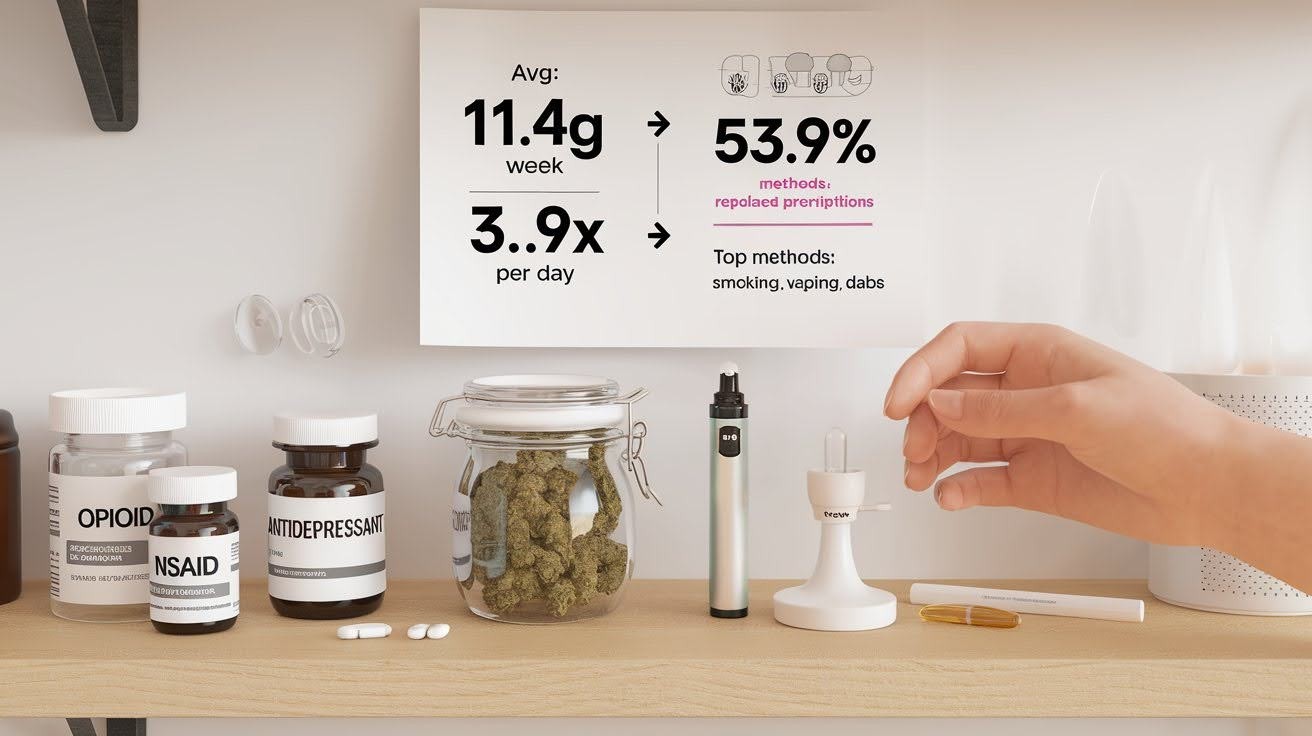
Let me share what actual patients are doing. The average patient with headaches uses 11.4 grams per week. They consume cannabis 6.4 days weekly, taking it 3.9 times daily. Over half (53.9%) replaced prescription medications with cannabis for headache treatment.
What medications did they replace most often? Opiates and opioids topped the list at 43.4%. Anti-depressants followed at 39%. NSAIDs came third at 21%.
For fastest relief, patients prefer: Smoking provides the quickest onset. Vaping ranked second for speed. Dabs offered rapid, intense relief. Why does this matter to you? These aren’t theoretical studies. Real people dealing with genuine migraines chose cannabis over traditional medications.
The data shows cannabis works, and patients are willing to replace powerful prescription drugs with it.
Making the Right Choice: A Practical Decision Guide
Stop guessing and start choosing smartly. Here’s your step-by-step guide to picking the right cannabis for your specific migraine needs.
Key Factors to Consider

Your headache type matters most. Tension headaches respond better to Indica’s muscle-relaxing effects. Sinus headaches often improve with sativa’s uplifting properties. For migraines? Try hybrids first.
Timing shapes your choice. Need daytime functionality? Sativa keeps you alert. Want nighttime relief? Indica helps you sleep through the pain.
Severity guides your decision: Mild symptoms often respond well to sativa’s gentle effects. Severe pain typically requires Indica’s stronger sedation.
Consider your lifestyle requirements. If you need to stay functional, choose sativa or hybrid strains. If you can rest, Indica is the best option.
Dosage and Administration Guidelines

“Start low, go slow” – this isn’t just advice, it’s essential for safety. High-THC strains tend to be more effective for managing severe pain. However, start with small amounts, regardless of the strain choice.
Timing matters too. Treat at the first sign of a headache for the best prevention results.
Most patients find that 2-3 treatments throughout the day provide optimal symptom management.
Professional Consultation is Key

In the UK, you need a specialist doctor’s prescription for medical cannabis. This isn’t optional, it’s the law. Doctors create personalized treatment plans based on how your body responds to different strains and doses.
Regular monitoring tracks effectiveness and side effects. Your treatment plan will evolve as you learn what works best for you.
Safety and Optimization Tips
Cannabis can backfire if used incorrectly. These simple safety tips help you avoid common mistakes and maximize your migraine relief.
Avoiding Cannabis-Induced Headaches

Here’s an ironic problem: Cannabis can sometimes cause the headaches you’re trying to treat. High-THC strains in large amounts may trigger rebound headaches. Start small and increase slowly.
Stay hydrated. Cannabis can cause dry mouth, and dehydration is a major migraine trigger.
Smoking sensitive? Consider other methods. Smoke irritation can worsen headache symptoms in some people.
Alternative Consumption Methods

CBD oils and tinctures offer precise dosing control. You can measure exact amounts and adjust easily. Vaping is beneficial for individuals with respiratory sensitivities. It’s gentler than smoking but still provides quick relief.
Edibles last longer but take 30-90 minutes to work. Plan if you choose this method for migraine prevention.
Conclusion
The choice between indica and sativa for migraines isn’t black and white. Your best option depends on your specific symptoms, timing needs, and lifestyle requirements. Here’s what we’ve learned: Indica works great for nighttime relief and severe pain.
Sativa helps maintain daytime functionality. Hybrids often provide the most balanced approach. Most importantly, terpene profiles matter more than strain labels. Focus on compounds like myrcene and caryophyllene rather than getting caught up in indica versus sativa classifications.
You now know how to make an informed decision. Remember to consult with a qualified medical professional before starting any cannabis treatment. Have you tried cannabis for your migraines? Share your experience in the comments below – your story might help someone else find relief.
Frequently Asked Questions
Is indica or sativa better for migraine pain relief?
Neither is universally better. Indica works well for nighttime relief and severe pain, while sativa helps maintain daytime functionality. Hybrid strains often provide the most balanced approach.
Can I use sativa strains during the day to help with migraines?
Yes, sativa strains are ideal for daytime migraine treatment. They provide pain relief while maintaining alertness and functionality, unlike indica strains, which cause sedation.
Which cannabis compounds are most effective for migraines?
THC and CBD are primary compounds, but terpenes like myrcene and caryophyllene play crucial roles in the cannabis plant. Research shows terpene profiles matter more than indica/sativa classifications.
How much cannabis should I use for migraine relief?
Start with small amounts and increase gradually. Most patients use 2-3 treatments daily, but dosage varies significantly based on individual tolerance and symptom severity.
Do I need a prescription for medical cannabis in the UK?
Yes, UK law requires a specialist doctor’s prescription for medical cannabis. You cannot legally obtain it for migraines without proper medical authorization and consultation.









